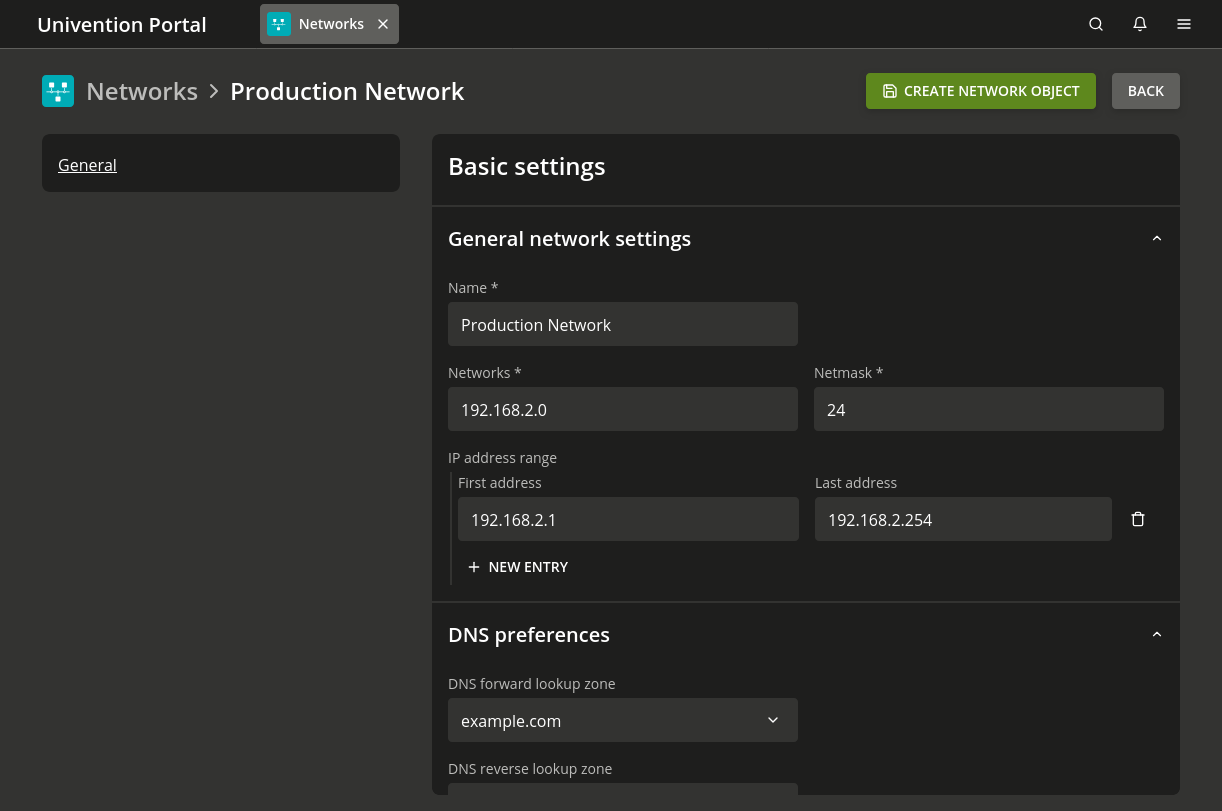8.5. Networks module#
Deployment — Kubernetes & UCS appliance
The Networks management module appears in both deployments. However, administrators mostly use it in the context of the UCS appliance with its network management capabilities.
Nubus offers the Networks management module to manage the assignment of available IP addresses to computers. The DHCP Service automatically assigns the next available address to the computer during IP address assignment. Fig. 8.5 shows the Networks management module.
This section provides a reference for the fields used in the Networks management module. You find the Networks management module in the Domain category in the Management UI.

Fig. 8.5 Creating a network object#
8.5.1. Example#
For example, you can define a network object Workstation network
that encompasses the IP addresses from 192.0.2.0 to 192.0.2.254.
If you create a Windows computer object
and assign this network object,
Nubus runs an internal validation for already assigned IP addresses
and selects the next available IP address for the computer object.
The procedure saves the administrator time
to choose the next available IP address manually.
If you remove the computer object,
Nubus automatically releases the IP address.
The IP address becomes available for reassignment.
8.5.2. Reference for Networks management module#
You can manage network objects in the Network management module. For more information about the Management UI, see Univention Management Console modules.
This section describes the fields of the Networks management module. To create a network object, open the Networks management module and click Add.
Packaged service — only available for UCS appliance
A packaged service using the information from network object is only available for the UCS appliance. You can manage the information in the Kubernetes deployment, as well.
- Name
The name of the network object under which the network also appears in the Computers module.
- Network
The network address in dot-decimal form, for example
192.0.2.0.- Netmask
The network mask in network prefix or dot-decimal form. If you provide the network mask in dot-decimal form, Nubus subsequently converts it into the corresponding network prefix and also shows it that way.
- IP address range
You can configure one or more IP ranges. If you assign a host to this network, Nubus automatically assigns the next available IP address from the IP range that you provide here.
If you don’t provide an IP range, the system automatically uses the range resulting from the network and the network mask.
You can select forward lookup zones and reverse lookup zones in the DNS preferences section. If you assign a host to this network, Nubus automatically creates a host record in the forward lookup zone and a pointer record in the reverse lookup zone.
If you don’t select a DNS zone, Nubus doesn’t create DNS records during computer object assignment. However, you can set DNS entries manually.
To administer DNS zones, use the DNS management module. For information, see Forward lookup zone.
- DNS forward lookup zone
The forward lookup zone for hosts in the network. The DNS performs the computer name resolution to an IP address through DNS zones.
- DNS reverse lookup zone
The reverse lookup zone for hosts in the network. The DNS performs the reverse resolution of the IP address back to a computer name through DNS zones.
- DHCP Service
You can assign a DHCP Service to the network in the DHCP preferences section. If you assign a host to the network, Nubus automatically creates a DHCP Host entry with a fixed IP address in the selected DHCP Service.
If you don’t select a DHCP Service, Nubus doesn’t create a DHCP Host entry during computer object assignment. However, you can assign a DHCP Host entry manually.
To administer DHCP Services use the DHCP management module. For information, see DHCP module.